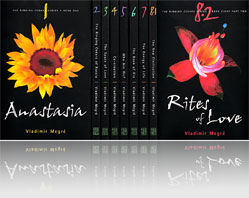Going beyond disease…
It's all about information-exchange with nature…
“… the benefits experienced by people who have set up such information-exchange
contacts with a little patch of the natural world go far beyond dealing with diseases…”
— Anastasia
Series author Vladimir Megré writes:
I was still interested in knowing what Anastasia had to say about food. After all, she has a rather unique dietary régime, and so I asked:
“Anastasia, tell me how you think a person should feed himself — what should he eat, how often during the day and in what amounts?”
“It is difficult to picture Man’s1 lifestyle any other way under the circumstances currently imposed by the technocratic world. The dark forces are constantly trying desperately to take the natural mechanism of this world — the one given to humanity right from the start — and substitute their own cumbersome artificial system which goes against human nature.”
I asked Anastasia to put it in more concrete and understandable terms, without her philosophical musings, and she continued:
“You know, these questions of yours as to what, when and how much a person should eat — they are best answered by the individual’s own body. The sensations of hunger and thirst are designed to send a signal to each particular individual, indicating when he should take in food. This precise moment is the right one for each person.
“The world of technocracy, being incapable of affording each individual the opportunity of satisfying his hunger and thirst at the moment desired by his body, has tried to force him into its own schedule based on nothing but this world’s own helplessness, and then attempted to justify this compulsion in the name of some sort of ‘efficiency’.
“Just think: one person spends half the day sitting down, expending hardly any energy, while another exerts himself with some kind of physical labour, or simply runs and perspires all over, thereby using up many times more energy, and yet both are expected to eat at exactly the same time.
“A Man1 should take in food at the moment advised by his body, and there can be no other advisor. I realise that under your world’s conditions this is practically impossible, but the opportunity does exist for people at their dachas2 with their attached garden-plots, and they should take advantage of it and forget about their unnatural, artificial régimes.
“The same applies to your second question: What should one eat? The answer is: whatever is available at the moment — whatever is on hand, so to speak. The body itself will select what it needs.
“I could offer you a bit of non-traditional advice: if you have a household pet like a cat or a dog, keep track of its movements carefully.
“Occasionally it will find something in the way of grasses or herbs and eat it. You should tear off a few samples of whatever it selects and add it to your diet. This is not something you have to do every day — once or twice a week is sufficient.
“You should also take it upon yourself to gather some cereal grain, thresh it, grind it into flour and then use the flour to bake bread. This is extremely important. Anyone consuming this bread even once or twice a year will build up a store of energy capable of awakening his inner spiritual powers — not only calming his soul but also exerting a beneficial influence on his physical condition.
“This bread can be shared with relatives and close friends. If shared with sincerity and love, it will have quite a beneficial influence on them as well.
“It is very helpful to every individual’s health to spend three days, at least once each summer, eating only what is grown in his garden-plot, along with bread, sunflower oil and just a pinch of salt.”
Megré continues:
I have already described Anastasia’s own eating habits. While she was telling me all this, she would unwittingly tear off a blade of grass or two, put it in her mouth and chew it, and offer me some too. I decided to give it a try. I can’t say the taste was anything to write home about, but neither did it provoke any sense of distaste.
It seems as though Anastasia has left the whole task of nourishment and life-support up to Nature; she never allows it to interrupt her train of thought, which is always busy with some more important issue. Even so, her health is as remarkable as her outward beauty, of which it is an inseparable part.
According to Anastasia, anyone who has established such a relationship with the Earth and the plants on his own plot of land, has the opportunity of ridding his body of absolutely every kind of disease.
Disease per se is the result of Man1 distancing himself from the natural systems designed to take care of his health and life-support. For such systems, the task of counteracting any disease presents no problem whatsoever, since this is their whole reason for being.
However, the benefits experienced by people who have set up such information-exchange contacts with a little patch of the natural world go far beyond dealing with diseases… (cont'd)
FOOTNOTES:
1. The word Man (with a capital M) is used throughout the Ringing Cedars Series to refer to a human being of any gender. Details on the word’s usage and the important distinction between Man and human being are contained in the Translator's Preface to Book 1.
2. dacha — a cottage in the country.
